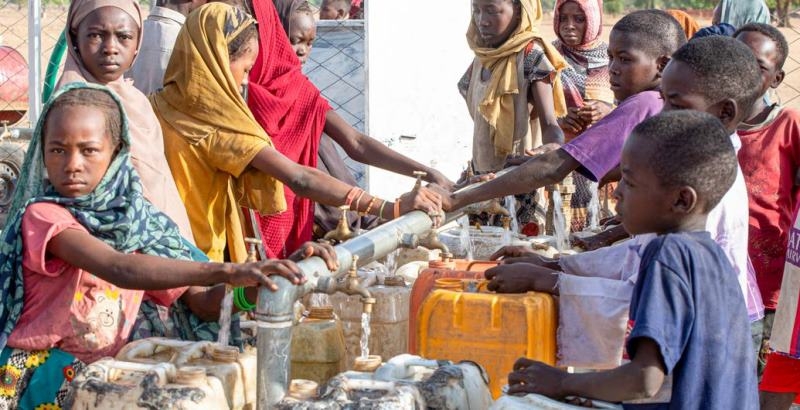- Middle East War Puts Bangladesh Jobs at Risk |
- Starmer criticises Trump, defends UK position not to allow use of its bases |
- Iran War: Nuke watchdog urges restraint amid ongoing strikes |
- 80pc tube wells in Chhatak run dry; water crisis acute |
- Advance Eid train ticket sale begins |
As Sudanese face famine, humanitarians plead for aid access

Children collect clean, safe water from a UNICEF-installed station in Al-Serif village in Sudans Darfur. © UNICEF-Tariq Khalil
31 May 2024 - Famine in Sudan is “imminent” if aid agencies continue to be prevented from providing relief, UN humanitarians warned on Friday.
In a bleak assessment of the dire situation in Sudan where conflict is in its second year, the heads of 19 global humanitarian organizations issued an alert that further obstacles to providing aid “rapidly and at scale” will mean that “more people will die”.
UN aid coordination office OCHA spokesperson Jens Laerke told reporters in Geneva that famine is “likely to take hold in large parts of the country, more people will flee to neighbouring countries, children will succumb to disease and malnutrition and women and girls will face even greater suffering and dangers”.
Staggering scale of hunger
Some 18 million people in the country are already acutely hungry and 3.6 million children are acutely malnourished, the OCHA spokesperson said.
These children are in grave danger, Mr. Laerke insisted, as “they are 10 to 11 times more likely to die” than youngsters who have enough to eat.
Despite soaring needs, aid workers continue to face “systematic obstructions and deliberate denials of access by parties to the conflict”, according to the humanitarian agencies’ joint statement.
Too dangerous to access
Mr. Laerke highlighted that “movements across conflict lines to parts of Khartoum, Darfur, Aj Jazirah and Kordofan have been cut off since mid-December” and that in March and April of this year, nearly 860,000 people were denied humanitarian aid in these areas.
Conditions for aid delivery are “very poor and dangerous,” he added, underscoring that aid workers are being killed, injured and harassed, while humanitarian supplies have been looted.
In addition, the closure in February of the Adré border crossing from Chad to western Darfur has reduced aid delivery in Darfur to a “trickle”.
Darfur success
In a more positive development last week, UN World Food Programme (WFP) trucks managed to enter Sudan from Chad through the Tine border crossing. The agency reported that 1,200 metric tonnes of food supplies for some 116,000 people are being transported across the Darfur region.
On Friday WFP Sudan’s Leni Kinzli confirmed that the convoys destined for Central Darfur (Umshalaya and Rongatas) have reached their final destinations, while the convoy headed to 12 destinations in South Darfur, including displacement camps in Nyala, is still in transit.
Meanwhile, Mr. Laerke warned that in North Darfur’s capital El Fasher, where fighting between the Sudanese Armed Forces (SAF) and the rival Rapid Support Forces (RSF) recently intensified, some 800,000 civilians are bracing for an “imminent, large-scale attack”.
Attacked from all sides
On Thursday, the UN’s top aid official in the country Clementine Nkweta-Salami warned that civilians are “under attack from all sides”.
She said that medical facilities, displacement camps and critical civilian infrastructure in El Fasher; North Darfur state, have been targeted by parties to the conflict, while parts of the city have been left without electricity and water.
In their joint statement the heads of humanitarian agencies called on the warring parties to protect civilians, facilitate humanitarian access and adopt a nationwide ceasefire.
Referring to Sudan’s two main warring parties, the SAF and RSF, Mr. Laerke said: “We want these generals to find a way to solve their differences not by violence that kills, maims, rapes hundreds of thousands of people in Sudan, but do it in another way”.
Concerned about low levels of funding for the crisis, humanitarians also called on donors to urgently disburse pledges made at the International Humanitarian Conference for Sudan and its Neighbours in Paris on 15 April.
Nearly five months into the year, the humanitarian appeal for Sudan for a total of $2.7 billion remains only 16 per cent funded. – UN News

